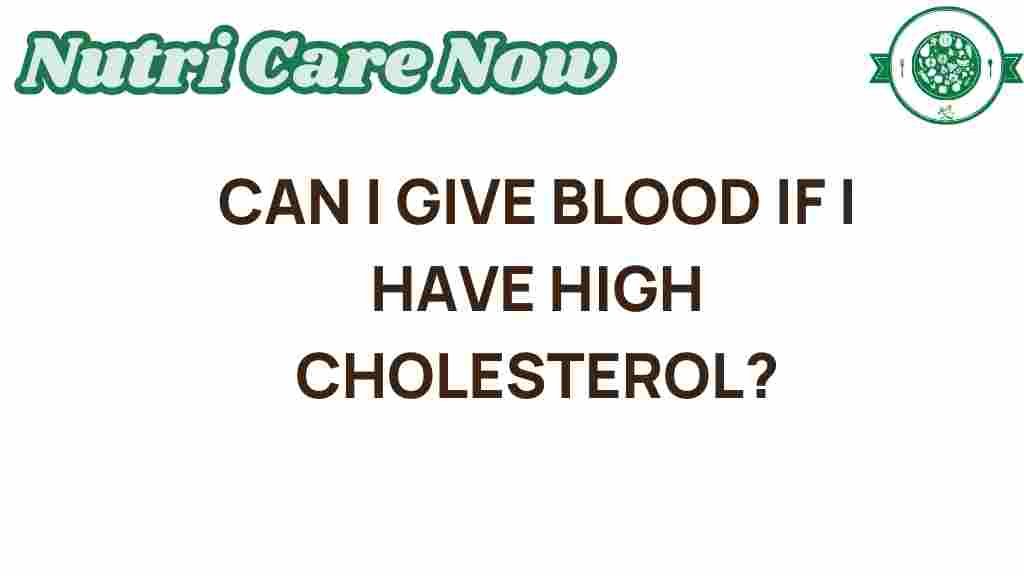Can You Donate Blood with High Cholesterol?
Blood donation is a vital process that helps save lives and supports those in need of transfusions. However, many potential donors often have questions regarding their eligibility, particularly those with health concerns such as high cholesterol. In this article, we will unpack the myths surrounding blood donation and high cholesterol, clarify the guidelines for donation eligibility, and discuss the importance of health awareness in relation to cardiovascular health.
Understanding High Cholesterol and Its Implications
Cholesterol is a waxy substance found in your blood, essential for building cells and producing hormones. However, when cholesterol levels are too high, it can lead to various health issues, including heart disease and stroke. Understanding your cholesterol levels is crucial for maintaining good health.
There are two main types of cholesterol:
- Low-Density Lipoprotein (LDL): Often referred to as “bad” cholesterol, high levels of LDL can lead to plaque buildup in arteries, increasing the risk of cardiovascular diseases.
- High-Density Lipoprotein (HDL): Known as “good” cholesterol, HDL helps remove LDL cholesterol from the bloodstream. Higher levels of HDL are beneficial for heart health.
Donation Eligibility and Cholesterol Levels
The eligibility to donate blood typically depends on various health criteria, including cholesterol levels. However, many myths surround the idea of donating blood with high cholesterol. Let’s explore some essential aspects of donation eligibility:
- Cholesterol Levels: Generally, individuals with high cholesterol (especially high LDL) are still eligible to donate blood, provided they do not have other underlying health conditions that could affect their health or the safety of the blood supply.
- Medications: Those who take medications to manage their cholesterol levels may still be eligible to donate, as long as they are not experiencing any adverse effects from the medication.
- Overall Health: Blood donation organizations prioritize the overall health of the donor. If you are feeling well and meet other health criteria, you are likely eligible to donate.
Health Myths Surrounding Blood Donation
Let’s debunk some common myths regarding blood donation and high cholesterol:
- Myth 1: You cannot donate blood if you have high cholesterol.
This is false. High cholesterol does not automatically disqualify you from donating blood. - Myth 2: Donating blood can lower your cholesterol levels.
While donating blood may have various health benefits, it does not directly affect your cholesterol levels. - Myth 3: Only people with low cholesterol can donate.
This is incorrect. Many donors have high cholesterol but are still eligible to donate blood.
The Blood Donation Process
If you are considering donating blood and have high cholesterol, it’s essential to understand the donation process. Here’s a step-by-step guide:
Step 1: Pre-Donation Screening
Before donating blood, you will go through a screening process, which includes:
- A questionnaire about your medical history, including any medications you are taking.
- Measuring your blood pressure, pulse, and hemoglobin levels.
Step 2: The Donation
The actual blood donation process typically takes about 8 to 10 minutes. Here’s what to expect:
- You will be seated comfortably while a healthcare professional cleans your arm and inserts a needle.
- You can relax, read, or chat with staff during the donation.
Step 3: Post-Donation Care
After donating, you will be advised to:
- Rest for a few minutes and enjoy refreshments provided to help replenish your energy.
- Drink plenty of fluids and avoid heavy exercise for the rest of the day.
Cholesterol Management and Cardiovascular Health
While high cholesterol alone may not prevent you from donating blood, managing your cholesterol levels is crucial for your health. Here are some tips for maintaining healthy cholesterol levels:
- Adopt a Heart-Healthy Diet: Focus on fruits, vegetables, whole grains, lean proteins, and healthy fats. Limit saturated fats and trans fats.
- Exercise Regularly: Aim for at least 150 minutes of moderate aerobic activity or 75 minutes of vigorous activity each week.
- Maintain a Healthy Weight: Losing excess weight can help lower LDL cholesterol and increase HDL cholesterol.
- Quit Smoking: If you smoke, seek help to quit, as smoking can raise cholesterol levels and reduce HDL.
- Consult Your Doctor: Regular check-ups and discussions about your cholesterol levels can provide guidance and necessary adjustments to your health regimen.
Troubleshooting Tips for Potential Donors
If you have high cholesterol and are unsure about your eligibility to donate blood, consider the following tips:
- Consult a Healthcare Professional: If you have health concerns, speak with your doctor to get personalized advice about blood donation.
- Contact Your Local Blood Donation Center: They can provide specific guidelines related to blood donation eligibility based on your health status.
- Stay Informed: Keep up with health awareness initiatives related to cardiovascular health and blood donation.
Conclusion
In conclusion, if you have high cholesterol, you can still be eligible to donate blood, provided that your overall health meets the donor guidelines. Understanding the myths surrounding blood donation and high cholesterol is crucial for promoting health awareness. Regular management of cholesterol levels is essential for your cardiovascular health, and donating blood is a noble way to help others in need. If you have questions regarding your eligibility, don’t hesitate to consult with healthcare professionals or your local blood donation center.
For further information about blood donation eligibility, visit the American Red Cross. Stay informed, stay healthy, and consider donating blood to make a difference!
This article is in the category Health and created by NutriCareNow Team
